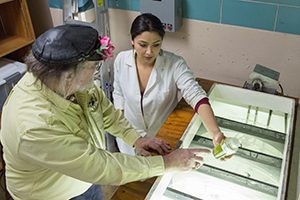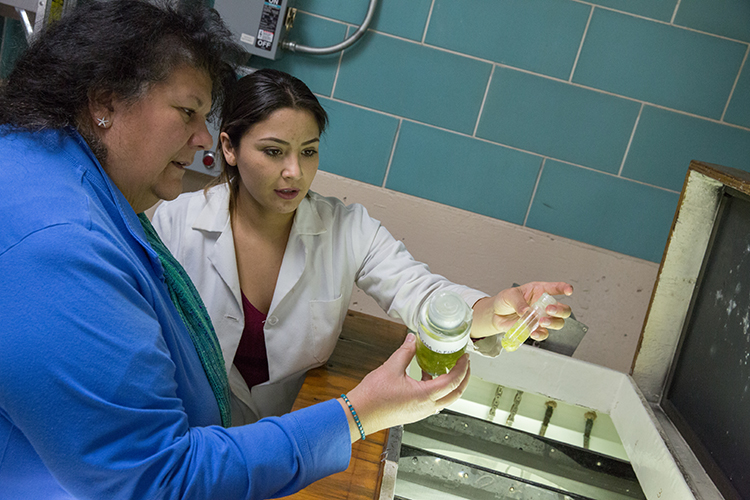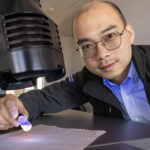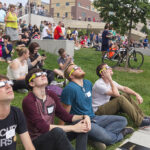Cristal Sanchez-Estrada is feeding her love of science by immersing herself in research on algae and phosphorus in lake waters.
The senior from Milwaukee sees her work as an undergraduate student scientist in a lab at the School of Freshwater Sciences as a way of fulfilling her passion for science as well as a foundation for a number of possible future careers.
“I am interested in all kinds of science,” said Sanchez-Estrada, who is majoring in biological sciences.
Last fall, Sanchez-Estrada was honored with the Carl J. Weston Memorial Scholarship from the National Oceanic and Atmospheric Administration as part of the Sea Grant Knauss Fellowships program. (Two doctoral students in Freshwater, Danielle Cloutier and Shelby LaBuhn, received Knauss fellowships through the program.)
Established in 1995, the Carl J. Weston Memorial Scholarship fund provides support for deserving undergraduate students working on Wisconsin Sea Grant-supported projects. Funding for the scholarship comes from Dr. and Mrs. Carl B. Weston in honor of their son.

Estrada-Sanchez’s work focuses on the role of phosphorus, a natural part of the aquatic ecosystem, in producing good and not-so-good nutrients in algae. Sunlight and nutrients such as phosphorus are used by algae to produce more algae, said Russell Cuhel, Estrada-Sanchez’s mentor and a senior scientist at the School of Freshwater Sciences. However, there are differences between algae that provide healthy nutrients for zooplankton and the other small creatures that fish feed on, and other algae, like Cladophora, that may be a biological “dead end” for nutrient and sunlight use, he said.
“Cristal Sanchez has adapted a method for measuring phosphorus in difficult solids, and is comparing the amount of phosphorus stored in the ‘dead end’ algae compared to that transferred up the food web by zooplankton animals,” Cuhel said.
“She will help us understand one of the several reasons for the debilitating loss of small fish in Lake Michigan, and ultimately the demise of commercial fisheries,” he added.
Sanchez-Estrada, who grew up in Milwaukee and graduated from Pius XI high school, is the first in her family to attend a university, and is also a McNair Scholar.
“I have a huge passion for science. I wanted to explore all the different fields in science, and I knew I wanted to continue in higher education,” she said.
The McNair program provided her with that research experience for first-generation students and the opportunity to present her findings at conferences. While it was a lot of work, she said, being a McNair Scholar helped prepare her to work in a lab at the School of Freshwater Sciences.
“I wanted to be involved in a research lab, and this one caught my interest because it involved biological sciences,” Sanchez-Estrada said. “All my interests came together in the research, and I’ve found it fun to be part of.” After two months working in Cuhel’s lab, she heard about the Weston scholarship and applied.
“Cristal’s work in the aquatic sciences field, particularly her activities in support of Sea Grant-funded research projects at UW-Milwaukee, combined with her aspirations to continue in the field for graduate school, made her a worthy recipient,” said Jennifer Hauxwell, assistant director for research and engagement at the University of Wisconsin Aquatic Sciences Center, which administers the scholarship.
Finding a niche at UWM
Sanchez-Estrada had started at UW-Madison before coming to UWM. She has found her niche here, she said, after struggling at Madison. “I decided to take a year off and then come back to school, so I came to UWM and I actually like it a lot more here.”
Being able to work with a mentor and do hands-on research is a big part of that. In addition to cruising out on Lake Michigan in the school’s research ship, the Neeskay, to collect algae samples, she’s learning from the lab work she’s doing with Cuhel.
“I’ve learned a lot from him,” Sanchez-Estrada said. “I’m learning how to be independent. He would ask me questions and help me think critically and outside the box. He’s been a great mentor, for sure.”
Sanchez-Estrada’s interest and foundation in science may lead her to other career paths when she graduates. When she graduates in May, she plans to apply to physician assistant programs, with graduate school in water sciences also a possibility. She may take a gap year to prepare those applications and take a break from classes.
“I have a strong passion for helping people, and a being a physician assistant is close to what a doctor does,” Sanchez-Estrada said. “There is a lot of communication with patients, helping them feel better. That’s a good fit with the nurturing side of my personality.”
Whatever her next step is, the fact that she is bilingual in Spanish and English will be an asset, she said. “I’ve done some research that shows it’s easier for people to express themselves in their first language. I think as a P.A., I will be able to communicate better with people whose first language is Spanish, and help work with them to figure out what is wrong when they come to the doctor’s office.”








